By all accounts, Hon. James Aylward, Leader of the Official Opposition here in Prince Edward Island, is a capable politician: he seems well-respected by peers of all political stripes, and well-regarded as the new leader of the Progressive Conservative Party.
Well-regarded as he may be, he would not historically be the kind of person you’d look to for bold ideas.
Until, that is, his guest opinion Consensus Government model could be effective solution to many concerns P.E.I. faces was published in The Guardian newspaper on March 23, 2018.
Suddenly Mr. Aylward catapulted from being one of the least interesting politicians on the Island to one of the most interesting ones.
The heart of Mr. Aylward’s argument:
It may seem strange for the leader of a political party to be suggesting the possible adoption of a system that does not involve the political parties. Nunavut was established in 1999 and deliberately opted for an elected assembly void of political parties. We now have four main registered political parties in the province, vying for support, advancing policies, raising money, nominating candidates. It may seem like a healthy political environment but is it the most effective? Each party offers some highly talented individuals, some are elected in government and have either a cabinet or backbench role, others are elected in opposition. Many times, the talent of backbench members and opposition members are underutilized in the governing process although they have an equal interest in helping Islanders. My interest in changing the current system is to come up with a process that fully utilizes the talents of all elected MLA’s.
Our current system is based on the winner take all, decide all. This reduces the role of individual MLA’s. As you may recall from part one of my article there is a need for serious reform of the role of MLA’s.
Consensus government achieves that. Each MLA is elected on an individual independent candidate basis. No party platforms, no party signs, no party advertising, no premiers selected by a party, no focus on politics over policy, no backbenchers, no formal opposition. Just good people elected by each district working to provide good government.
This is an interesting idea for three distinct but overlapping reasons.
First, as Mr. Aylward himself states, it’s “strange for the leader of a political party to be suggesting the possible adoption of a system that does not involve the political parties.” That not only takes courage, but it also immediately vaults the idea into a place where it can be seriously considered: proposed by someone on the fringes of the established Island political scene, it would be seen suspiciously anarchistic; from the leader of a long-established political party whose seen where the bodies are buried, it’s something we all need to take seriously.
Second, it speaks well of Mr. Aylward’s skills as a leader. We’re in the heart of a protracted multi-year debate about the future of electoral politics here on Prince Edward Island, with intractable sides having dug in deep on both sides of the issue as to whether we should adopt proportional representation or maintain first-past-the-post. Rather than jumping into the fray of choosing option A or option B, Mr. Aylward has, instead, proposed option C. Or, indeed, more like option Σ. In a world of “should we have pizza or Thai?”, Aylward has proposed “bicycling.”
Third, and most significant, is that it sounds like a very good idea.
It has been my almost-universal experience that if a diverse group of fair-minded people come together to make a plan, great things–things that none of them as individuals would be capable of–can result. That is the heart of consensus, and the skills it fosters–compromise, creativity, compassion, cooperation–are all ones mostly absent in our current “you’re a jerk–no, you’re a jerk” method of governing ourselves.
In a fascinating January essay The problem with voting, Nadia Eghbal wrote, in part:
The goal of consensus seeking is to discuss concerns until no blockers remain, without coming to a vote. A vote is considered the “failure” outcome. Participants voice their concerns and listen to each other, but try to avoid blocking (or stalemating) the proposed course of action. When no blockers remain, stakeholders are said to have reached consensus.
Under consensus seeking, a proposal theoretically might have won 10–2, but if those 10 felt weakly about their support, and those 2 feel strongly opposed, the minority could still win.
This is decidedly not how we are governed here on Prince Edward Island, but I believe that we all have it deep within us to cooperate at this level.
Mr. Aylward deserves our thanks for raising this issue now, at this important juncture; I am hopeful that it will broaden the boundaries of the upcoming re-debate of proportional representation.
Peter Bevan-Baker, Leader of the Third Party, agrees, writing in a response to Mr. Aylward’s opinion piece:
Personally, I’d love to see a full discussion on the appropriateness of the Nunavut style of government for P.E.I. – indeed it was brought up by a small number of presenters during the community engagement phase of the electoral reform process we underwent leading up to the plebiscite in 2016.
So, thank you, James Aylward, for your radical idea. In the meantime, let’s honour the vote, adopt Proportional Representation, and take a bold step towards what many of us – including Aylward, and apparently the PC caucus - would love to see practised in Island politics: Politicians collaborating in non-partisan consensus decision-making for the betterment of our community.
With its overturning of the results of the last electoral reform plebiscite, and generally antediluvian attitude toward anything but the electoral status quo, the Liberal Party of Hon. Wade MacLauchlan has appeared dramatically out of sync with the progressive zeitgeist burbling through the Island; together Mr. Aylward and Mr. Bevan-Baker are raising the ante even further. The coming months, as a result, may make for some of the most interesting, substantive political debate the Island has seen since Confederation.
When I was first learning the printing trade at the Peterborough Examiner, back in the early 1990s, I worked exclusively in the Composing Room. There we made up the pages for the newspaper each day, shot negatives of them, and then dropped the negatives down a chute to the Pressroom where plates were made and newspapers printed.
Over the almost two years I worked at the paper, I never once saw what happened at the other end of the chute: the only evidence that anything happened was that sometime after we dropped the last negative, the Pressroom would send a printed newspaper back up the shoot for us to proof.
For the six years my letterpress operation was based at The Guild, circumstances meant that, inconveniently given that it was just me, composing and printing were similarly split over two floors.
With my new setup, however, everything’s in the same room, and evidence this week suggests that the difference will be dramatic. Not only have I printed more this week than I have in the last 6 months, but I’ve been more creative, paid more attention to detail, and have been happier with the results. There’s something to be said for removing logistical friction, especially when that friction involves hauling heavy formes up and down the stairs.
I’m traveling to New Hampshire next week to spend time at The Old Farmer’s Almanac. We’ll be marking together the 10th anniversary of the death of my friend and colleague the late John Pierce.
John was many things, including a poet, and some years ago his wife Sherin shared with me some of the poetry that John wrote when he was at Dartmouth in the late 1960s. I made some copies, with an eye to perhaps someday setting and printing some of the poems.
That someday was today, as it turned out. I selected one of John’s poems, one he wrote in 1968 called Specialization, and set it in 24 point Futura.
Having printing and composing all in the same space made the makeready process—the many adjustments to the type and it’s arrangement required for a clean print—so, so much easier. What would have been exhausting and exasperating a month ago flowed free and smoothly today.
Copies are drying tonight, and tomorrow I’ll pack them all up for sharing next week with John’s family, friends, and co-workers.

Back in late February I went to see my family doctor about a suspicious-looking mole on my back. The mole turned out to be nothing to worry about, but when the doctor took my blood pressure before I left he was a little concerned about the diastolic reading (aka “the bottom number”), and he asked me to monitor my blood pressure for a few weeks and come back for a follow-up.
“Monitor something for a few weeks” is like honey to someone like me, interested in personal analytics, so I took him very seriously, taking 104 readings over 6 weeks on our home blood pressure monitor (a LifeSource UA-767) and recording each in the excellent Blood Pressure Companion app for Android.
What I found is that, although there were peaks in my systolic and diastolic readings over that period, my average blood pressure was 121/80, which puts me almost exactly in the “low risk” bracket outlined by the Heart and Stroke Foundation.

I had a follow-up visit with my doctor today–actually a resident working with him this week–and she gave me the all-clear “there’s nothing to worry about here” signal. She also asked to keep my report in my file as a baseline against which future monitoring can be compared.
Last month I requested and received data about my use of my Air Miles card in an access request to the company that manages the program. One of the things I learned from analyzing the data I received is that my most frequent use of my Air Miles card was at Sobeys, the grocery store where I do most of the weekly grocery shopping for our family.
This begged the question: what additional information about me does Sobeys itself hold.
And thus my next access request: following the guidelines here, I sent the following request to Sobeys’ Privacy Officer:
Under the provisions of the Canadian Personal Information Protection and Electronic Documents Act, I would like to request a copy of personal information held by Sobeys Inc. and its direct and indirect subsidiaries, parents and affiliates about me.
Please advise as to the following:
1. Please confirm to me whether or not my personal data is being processed. If it is, please provide me with the categories of personal data you have about me in your files and databases.
a. In particular, please tell me what you know about me in your information systems, whether or not contained in databases, and including e-mail, documents on your networks, or voice or other media that you may store.
b. Additionally, please advise me in which countries my personal data is stored, or accessible from. In case you make use of cloud services to store or process my data, please include the countries in which the servers are located where my data are or were (in the past 12 months) stored.
c. Please provide me with a copy of, or access to, my personal data that you have or are processing.
2. Please provide a list of all third parties with whom you have (or may have) shared my personal data.
3. If you are additionally collecting personal data about me from any source other than me, please provide me with information about that source.
4. Please advise how long you store my personal data, and if retention is based upon the category of personal data, please identify how long each category is retained.
5. I would like to know whether or not my personal data has been disclosed inadvertently by your company in the past, or as a result of a security or privacy breach.
I sent this request on March 19, 2018 and I received back a reply today.
Here is Sobeys’ response to my queries, question by question:
Please confirm to me whether or not my personal data is being processed. If it is, please provide me with the categories of personal data you have about me in your files and databases.
Name – (Peter L Rukavina)
Email address – (peter@rukavina.net) - we have a record of your email address associated with opt-outs of our online communications known as “Better Food News” and “Sobeys eFlyer” on January 25, 2015, and opt-out for our discontinued Club Sobeys communications program on September 9, 2013. Your email address will be retained indefinitely on a list of unsubscribed emails to ensure that no communications are sent to your email address in the future unless you opt in to a communication at a later date).
Date of Birth - (April 5, 1966)
Home Address – (100 Prince Street, Charlottetown PEI, C1A 4R4)
Transaction data back to December 8, 2015 – we have transaction data in our system which is attributed to your Air Miles number – this data indicates your purchases for transactions where you displayed your Air Miles card. Here is a sample of the data; we can make the full file available to you upon request.
Please provide a list of all third parties with whom you have (or may have) shared my personal data.
We receive information from LoyaltyOne, Co., which administers the Air Miles program, and share your name and email address with our email communications agent, Inbox Marketer Corporation; we also share your name and home address with our direct mail agent, Transcontinental Printing Inc. Both of these shares are for the purposes of sending Air Miles co-branded offers. Inbox Marketer Corporation also has your email address on a do not contact list for the purposes of the communications we set out above. Our contracts with these third party providers contain strict privacy protection provisions and expressly prohibit them from using your personal information for any purpose other than as directed by us.
If you are additionally collecting personal data about me from any source other than me, please provide me with information about that source.
We are not collecting personally identifying information about you from any other source.
Please advise how long you store my personal data, and if retention is based upon the category of personal data, please identify how long each category is retained.
Your name and email address would be stored for the duration of your active consent to any of our electronic communications; should you opt out of any of our electronic communications, your email address would be stored indefinitely on a do-not-contact email list. Information received pursuant to your enrollment in the Air Miles program will be retained so long as you remain an Air Miles member; the transaction data related to your purchases in our stores where you show your Air Miles card is kept for 27 months.
I would like to know whether or not my personal data has been disclosed inadvertently by your company in the past, or as a result of a security or privacy breach.
We are not aware of any breaches of any of your personally identifying information.
The privacy officer included an additional note, which shows both good humour and attention to detail:
We note of course that all of the information referred to herein is also now on our email servers for the purpose of responding to your request. Data in our email servers is kept for up to 7 years.
I followed up with a request for the “transaction data in our system which is attributed to your Air Miles number” that was offered, and a few hours later I received a password-protected Excel file (with the password under separate cover) containing information about every product I’d purchased from Sobeys (or its Needs-branded convenience stores) from December 8, 2015 up to and including the day of my access request.
I loaded that Excel file into LibreOffice, converted the date column to YYYY-MM-DD, and exported it as a CSV file. There is data there on the 1,759 products I purchased over 82 visits to the store over 850 days. That’s an average of one visit every 10 days.
What I Purchased
Using the Pivot Table feature of LibreOffice, I summarized the data by product.
I purchased 431 individual products on those visits; the 10 most frequently-purchased products were:
- Purity Milk Homo 3.25% MF
- Dorset Muesli Simply Nutty
- Avocados Hass Large West
- ADL Butter Salted
- Oasis Juice P/AplBan-Orng
- Comp Water Sparkling Original
- Liberty Yogourt Blueberry Org
- Comp Water Sparkling LemonLime
- Oasis Juice Tropical Passion
- Comp Jumbleberry Blend
Breakfast accounts for most of that (milk for coffee, muesli and yogurt, juice for Oliver), which makes sense as I buy a lot of what we eat for supper at the Charlottetown Farmers’ Market or at Riverview Country Market.
By dollar value rather than quantity the top 10 is a little different:
- Dorset Muesli Simply Nutty
- ADL Butter Salted
- CntrlRst Almnd Dry Roasted Uns
- Bagel Montreal Style Sesame
- Purity Milk Homo 3.25% MF
- Liberty Yogourt Blueberry Org
- Sensatns Cheese Swiss Slices
- Just Us Italian Roast Wh/Bean
- NatClean Hand Soap Liq P/Mint
- Comp Jumbleberry Blend
Where I Shopped
I do the weekly grocery shop at Sobeys on Allen Street in Charlottetown (which they call their “University Avenue Store”), so it’s no surprise that’s where most of my transactions happened. In order of dollars spent, the stores I shopped in were:
- Sobeys University Avenue Store
- Sobeys Babineau Drive
- Foodland Charlottetown
- Sobeys Stratford Store
- Truro Highway 102 Needs
- Charlottetown Euston Street Needs
How Much I Spent
Over those 82 visits to Sobeys I spent $8,111, or an average of $98 a visit, which sounds about right given what I’m used to paying every week at the checkout.
The least expensive thing I purchased was ginger root, for 56 cents.
The most expensive item was 51 of something listed only as “UNKNOWN PRODUCT FROM PRODUCT_FACT” from the Needs in Mount Albion; I suspect that this was 51 litres of gasoline.
The price of pound of ADL butter ranged from $4.99 to $6.00 over this period; the price of 2 litres of 3% Purity Dairy milk ranged from $3.39 to $3.79 (or $4.45 at the Needs convenience store).
What More Can I Learn?
With some additional post-processing–dividing products into categories, for example–I’m sure I could learn more: if you’re the curious and/or helpful type, you’re welcome to grab the data file and contribute your own analysis (a reminder that everything posted in this space, as outlined here, here is covered by a Creative Commons Attribution-NonCommercial 4.0 International License).
It’s budget day in the Legislative Assembly of Prince Edward Island today.
I arrived for work at the new office in St. Paul’s Parish Hall to find some very serious looking people protecting the entrances to the main hall, and what appeared to be some very serious looking journalists poring over very serious looking documents.
I assume that this means that the so-called “budget lock-up” is happening mere steps from where I type here in the basement. While this affords me no special access to the financial future of the province (unless I engage in subterfuge), the excitement of proximity is nonetheless palpable.
As I related in this space 11 years ago, I used to be deeply involved in the budget lock-up, as I was myself locked up so as to ready the budget documents to go online. Like they did for the first time in 1997.
I have many pleasant memories of that first and subsequent lock-ups, memories that are inseparably linked to the taste of mint-flavoured Nanaimo bars that used to be brought in from Central Farmer’s Coop for the assembled media and their Provincial Treasury informants.
One of the good things to spring from the regrettable Plan B expressway development here on PEI some years ago was the PEI Citizens Alliance.
And one of the great things about the PEI Citizens Alliance is its daily email newsletter, which they describe as “a daily e-newsletter of Island environmental and democratic news, and upcoming events.”
I think of it more as a “daily email newsletter that supports active citizenship,” and I have been a happy subscriber since learning about it earlier this year.
Editor Chris Ortenburger crafts a daily package of information about the Legislative Assembly and its sittings and committee meetings, political events, environmental activities and other useful miscellanea.
You can subscribe simply by sending an email to citizensalliancepei@gmail.com and you can find back issues here.
We’ve just finished an excellent birthday supper crafted by Catherine and Oliver, and so I officially turn 52 years old.
We started with appetizers (here and here), moved on to shrimp and fish tacos, and finished with a sugarless chocolate mousse with fresh berries. All of this was accompanied by a Spotify playlist of the songs of my life prepared by Oliver that ran from Stephen Fearing to Stan Rogers.
Oliver wrote on his blog “A man travels the world over in search of what he needs and returns home to find it.” How right he is.
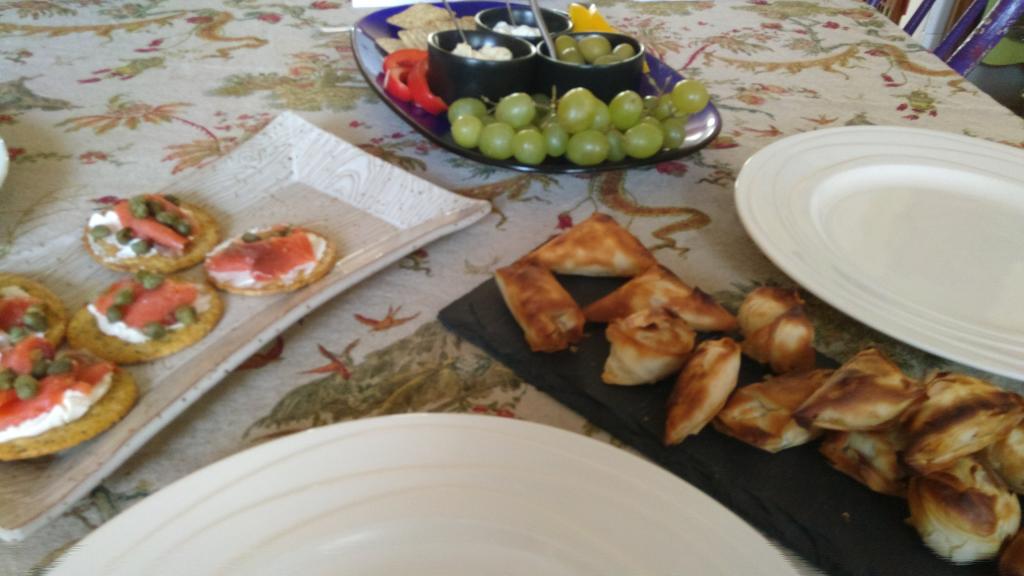 ,
, 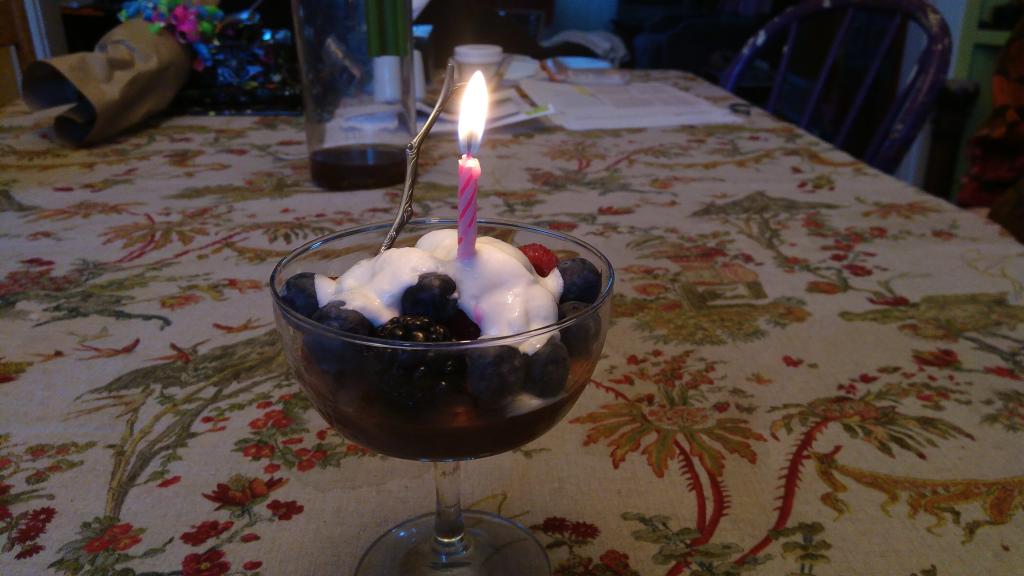 ,
, 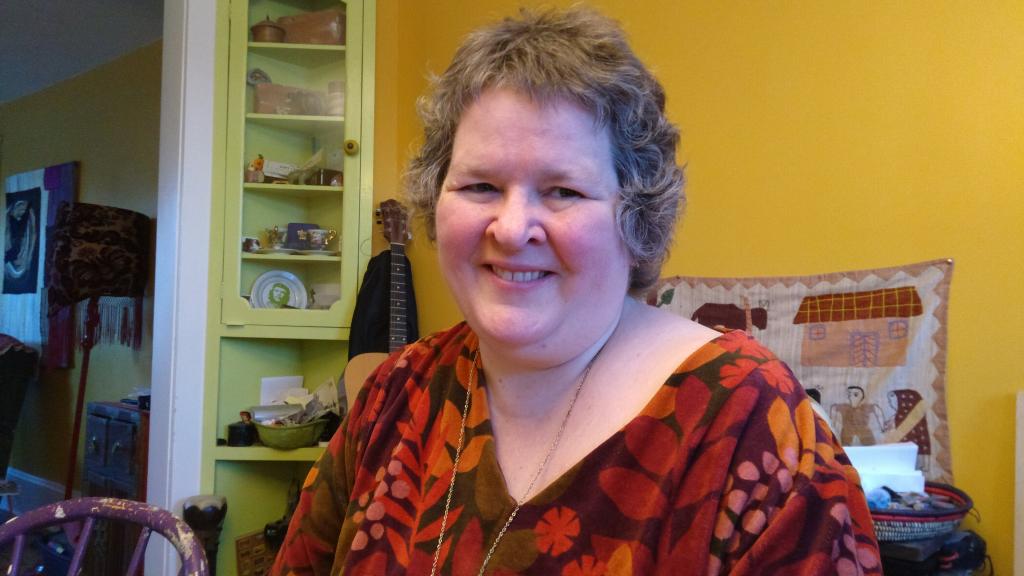 ,
,  ,
, 
In Ottawa last month, at the celebration of the life of my late friend Laurie Kingston, each of the chairs in the Glebe Community Centre was adorned with a piece of knitting, created in Laurie’s memory.
We were invited to take these with us at the end of the day, and I put mine inside my bag, where I promptly forgot about it.
Last week, I noticed my bag was starting to get weighed down with various inessentials, so I set to clean it out, and rediscovered the pink heart I’d tucked there in Ottawa.
My new office, being a former Sunday School classroom, has an abundance of bulletin boards, but, at present, not enough thumbtacks. So Laurie’s heart ended up sharing a tack with a partial print of my letterpress map of Charlottetown.
I rather like the way they go together, and I appreciate having a little bit of Laurie’s spirit nearby as I work.
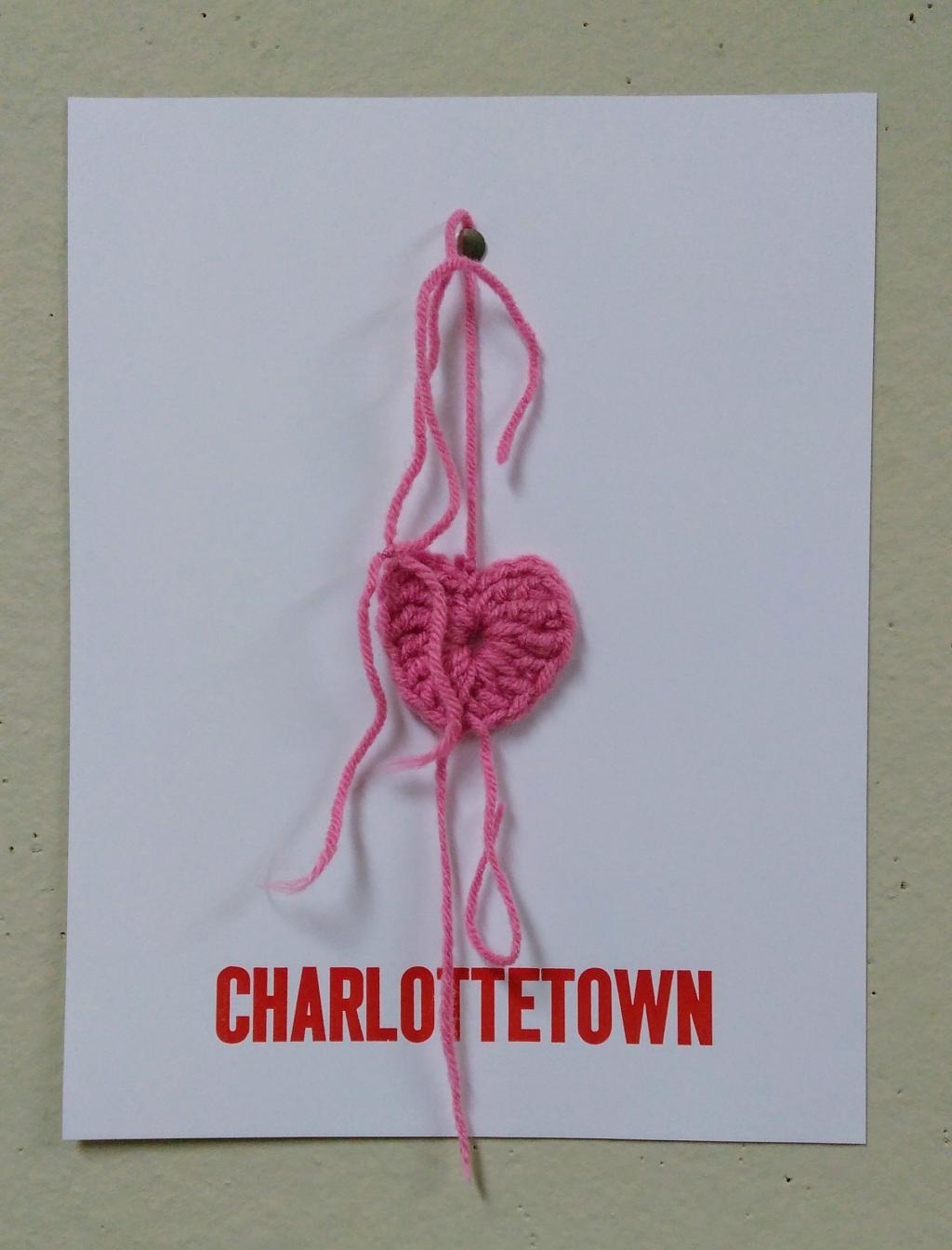
I’ve mentioned this before, but it bears repeating: the civilized way to drive from PEI to Halifax involves a stop for coffee in Sackville, New Brunswick.
I’m the first to admit that this is counter-intuitive: driving to Sackville means a small amount–10km in each directions–diversion from the mad dash to the big city.
And it’s not even halfway there.
But this is part of the point: doing something counter-intuitive and pokey slows the trip down just enough to remove a lot of the mad from the mad dash.
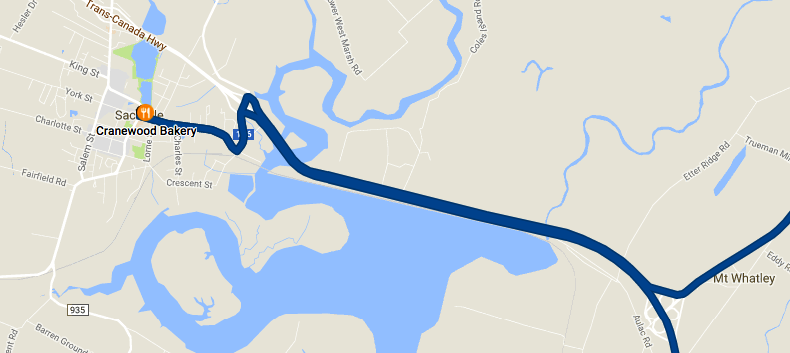
What clinched the deal for us was discovering Cranewood on Main, an excellent bakery cum sandwich shop cum coffee shop cum Mount Allison University student hangout. It’s tucked in behind Bridge Street, out of view enough that you might drive right by it if you’re not paying attention.
Their coffee is good, their sandwiches delightful, and their staff friendly. And they serve a macchiato in wonderful round-and-square glassware.
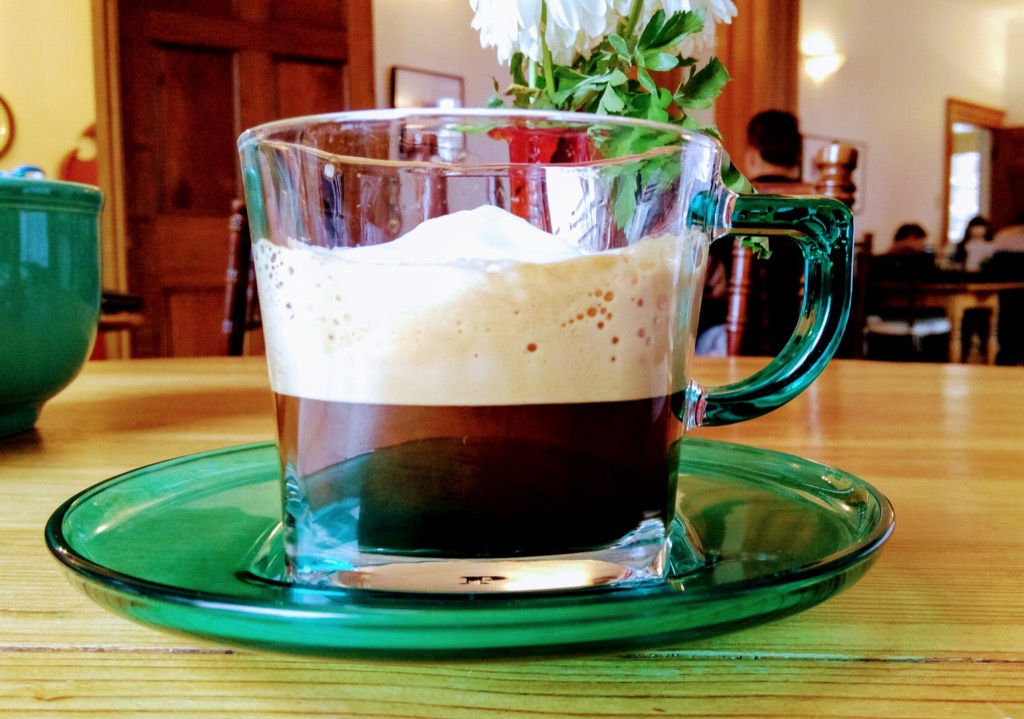
Oliver and I spent the Easter weekend in Halifax; it was the tail end of his March Break. We drove over on Thursday night and returned on Sunday afternoon, packing a lot of fun and adventure into those three days.
Normally I’d post a “highlight reel” of the places we visited, but Oliver’s taken over the duty now, so I’m free from that responsibility.
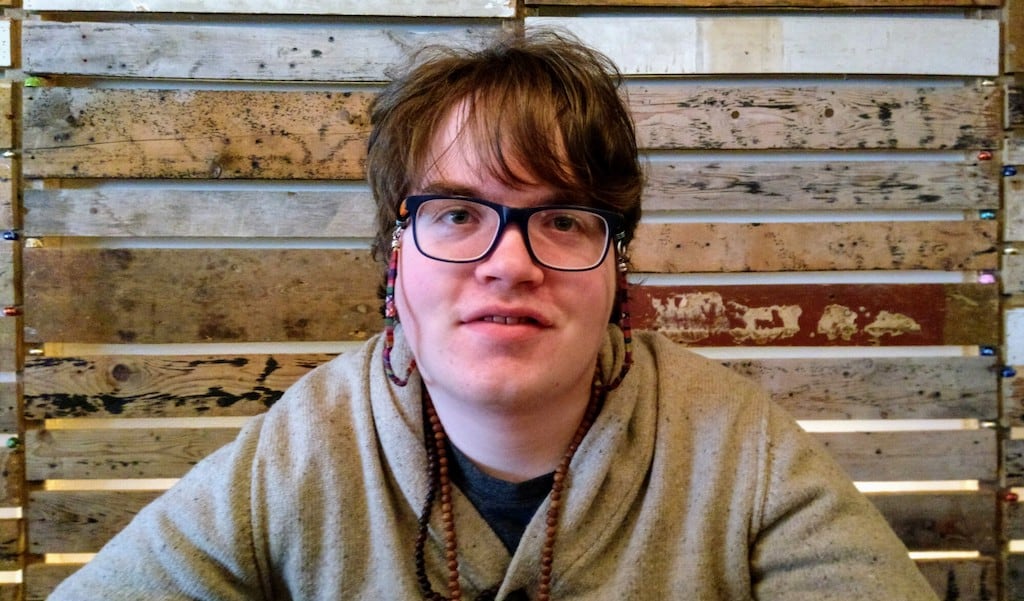
We finished our visit with brunch at Edna. There were chocolate Easter eggs hidden all over the place (you can see them if you look carefully at the photo above) and the service and food were fantastic.
 I am
I am